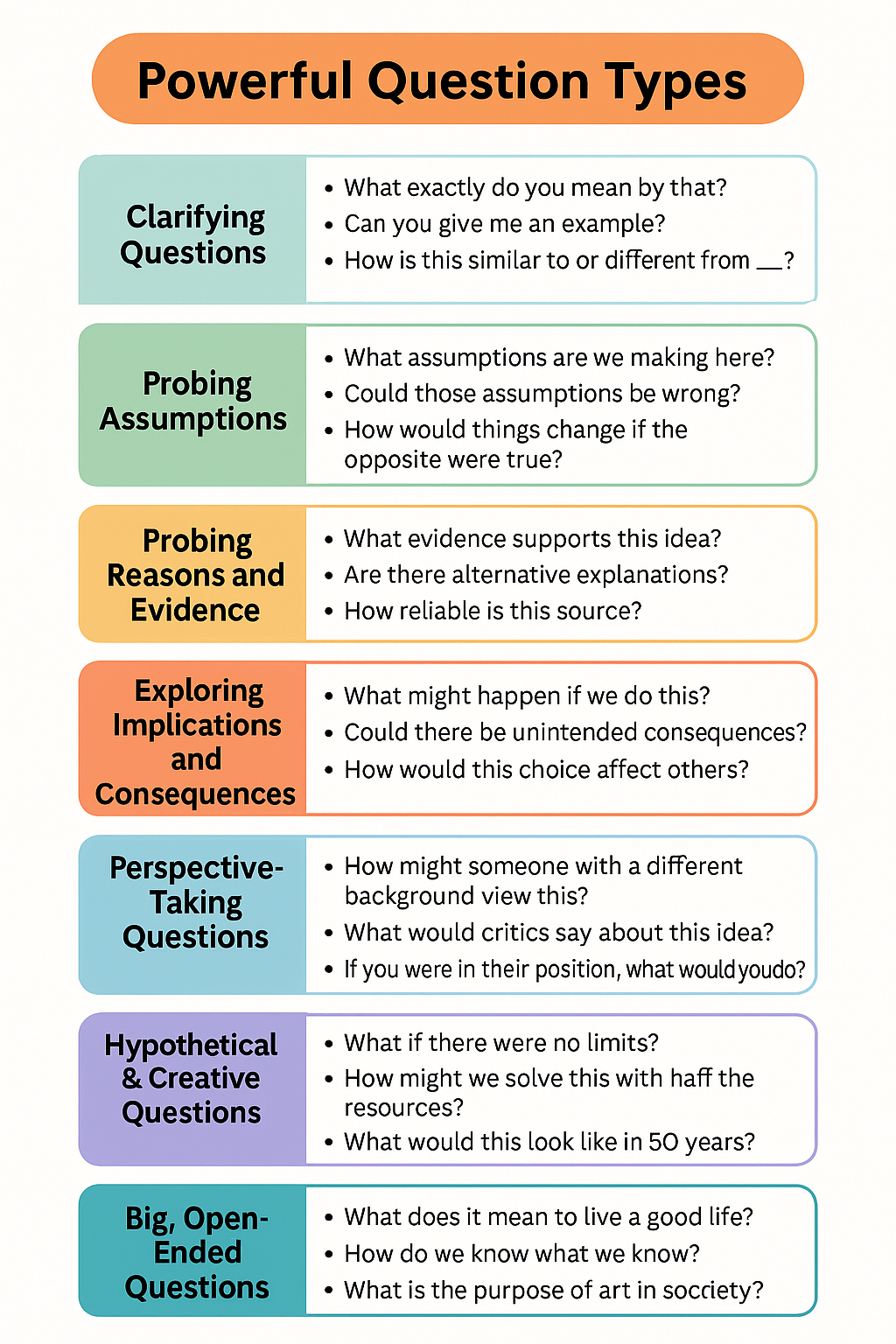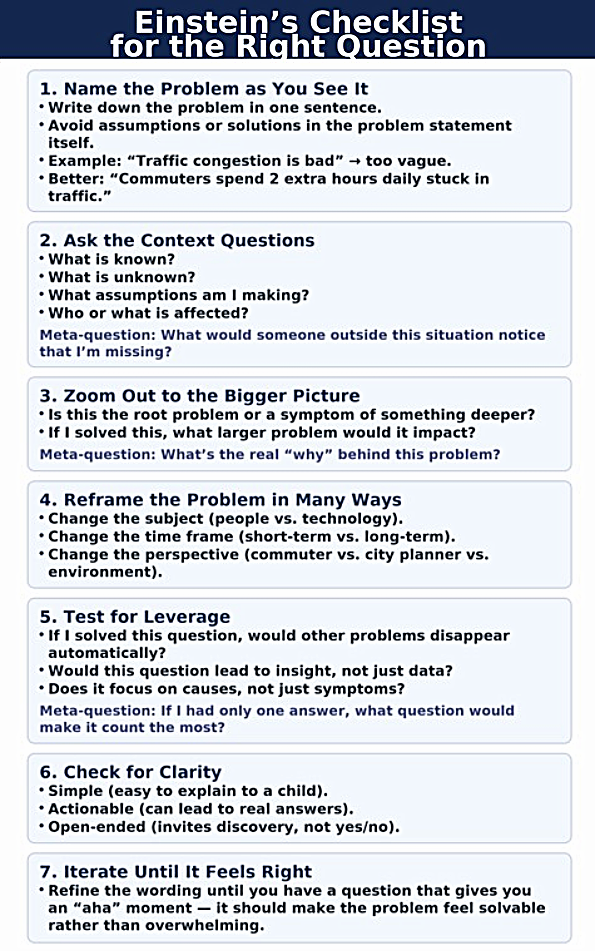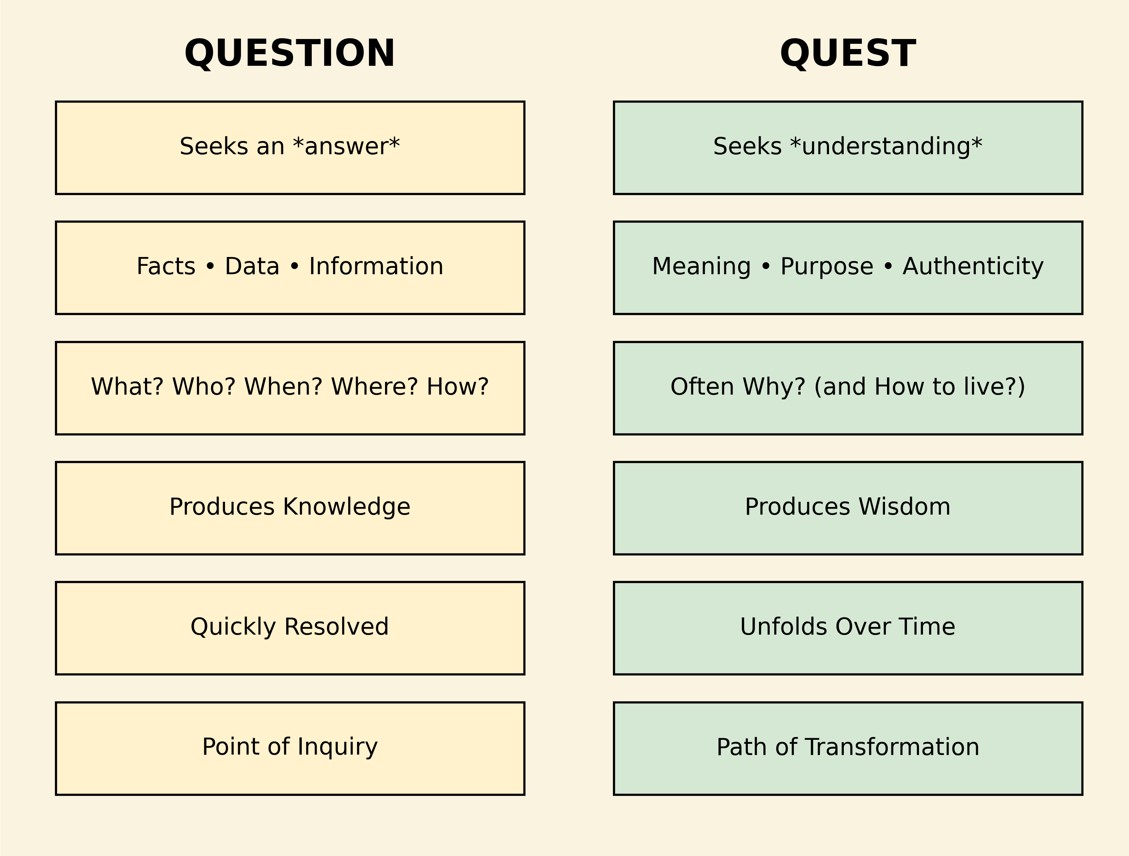The Power Of Asking The Right Question
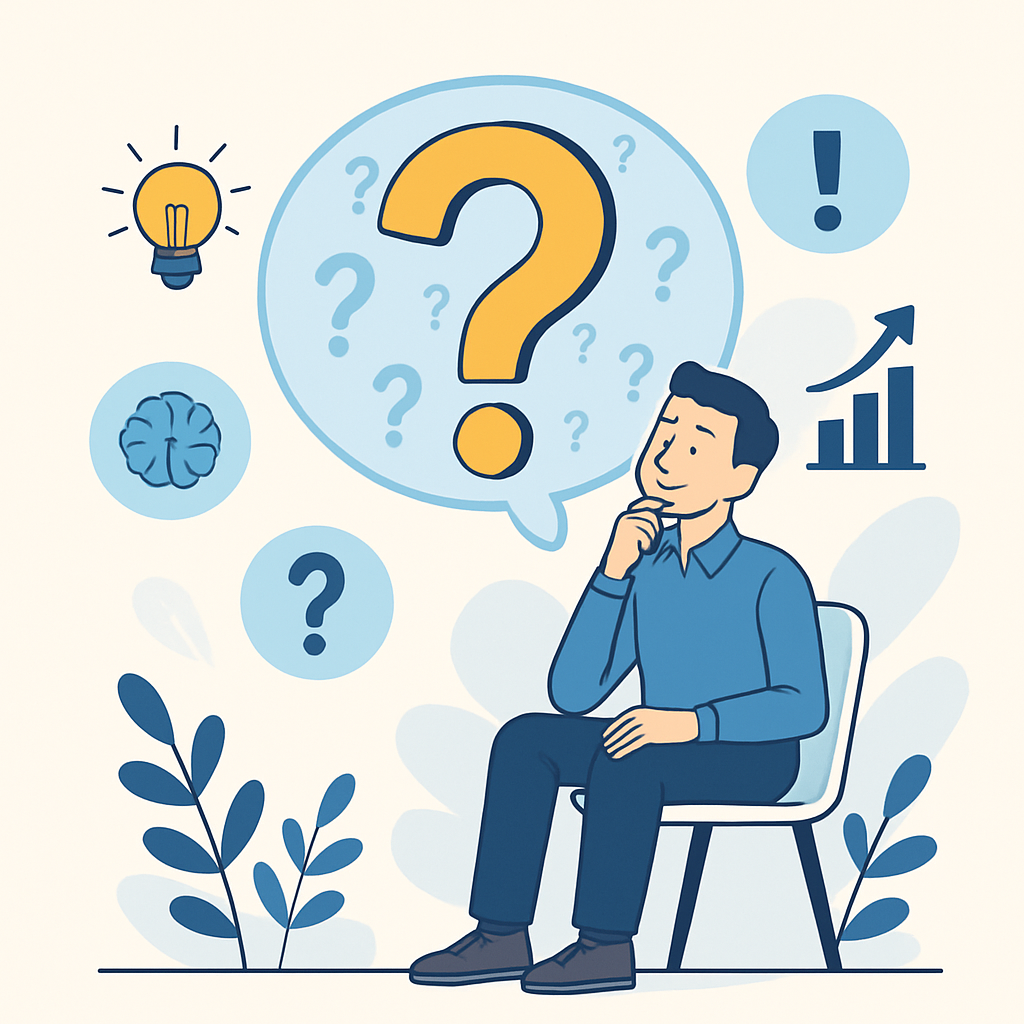
I remember vividly the first time I discovered the power of asking the right question.
It happened on my first assignment as a business consultant. I was part of a two man team and I was the junior partner to a highly experienced consultant.
Our brief was to conduct a preliminary investigation, on behalf of a c-suite executive, in an underperforming business unit that was part of a large company in the UK.
I felt overwhelmed and inadequate and I said to my colleague:
"Martin, how on earth do we do this? We are not experts in this company's line of business...we don't have all the answers...in fact I'm not sure I have any answers..."
I will never forget his response:
"Stephen, we are not expected to have the answers, but we are expected to be capable of asking the right questions."
Many of the articles on this site are about asking questions, ranging from thinking skills: first principles thinking and second order thinking, mental models such as root cause analysis; life skills such as dealing with setbacks, knowing when to quit, change and transition.
Throughout my career I have worked in many different sectors and I have always found that asking questions is critical to effective performance.
To experience the power of asking the right question you must develop the practice of asking questions.
In my experience, the best way to improve the quality of your questions is to treat this as a thinking skill - a skill to be learned and developed.
Here’s why, along with how you can improve:
Why Asking Questions Is a Thinking Skill
Asking questions:
- Promotes Critical Thinking - Good questions help you analyze information, uncover assumptions, and see connections you might otherwise miss.
- Drives Curiosity and Learning - Questions open doors to new ideas. They help you go beyond surface-level understanding and explore topics deeply.
- Improves Problem-Solving - Often, solving a problem begins with asking the right question. It reframes the challenge and can lead to creative solutions.
- Supports Better Communication - Questions clarify meaning and encourage others to share insights, leading to richer conversations and collaboration.
How to Get Better at Asking Questions
Here are some practical ways to develop this skill:
- Ask “Why” and “How,” Not Just “What”
- Use Open-Ended Questions - Questions starting with why, how, what if encourage discussion and critical thinking. Avoid yes/no questions if you want deeper insight.
- Build on Answers - After hearing a response, keep the conversation evolving by following up with: Can you explain that further? What makes you say that?
- Learn to Clarify and Probe - When something isn’t clear, ask for examples, definitions, or reasoning. This prevents misunderstandings and helps you get to the heart of the issue.
- Read Widely and Stay Curious - The more knowledge you have, the more connections you can make and the better your questions will become.
- Reflect on Your Questions - After a conversation or study session, look back: Which questions led to the best insights Which ones were too vague or narrow?
How To Formulate Effective Questions [Opens in new window]
Please note: If you click on the schematics shown below they will open in a new window, and right click, "save as", to download.
Here’s a list of powerful question types that scientists, journalists, philosophers, and creative thinkers often use to sharpen curiosity and critical thinking.
I’ve grouped them so you can see how each type serves a different purpose:
[1] Clarifying Questions - remove ambiguity and ensure shared understanding.
Used to understand concepts or ideas more clearly.
- What exactly do you mean by that?
- Can you give me an example?
- How is this similar to or different from ___?
[2] Probing Assumptions - to challenge hidden beliefs or biases - used to uncover what someone [or you] is taking for granted.
- What assumptions are we making here?
- Could those assumptions be wrong?
- How would things change if the opposite were true?
[3] Examining Reasons and Evidence - to understand why someone believes what they believe - to strengthen reasoning and guard against weak arguments.
- What evidence supports this idea?
- Are there alternative explanations?
- How reliable is this source?
[4] Exploring Implications and Consequences - to think ahead and explore "what ifs" - to encourages long-term and big-picture thinking.
- What might happen if we do this?
- Could there be unintended consequences?
- How would this choice affect others?
[5] Perspective-Taking Questions - to see things from multiple angles - to build empathy and broaden understanding.
- How might someone with a different background view this?
- What would critics say about this idea?
- If you were in their position, what would you do?
[6] Hypothetical & Creative Questions - for brainstorming and innovation - to spark creative problem-solving.
- What if there were no limits?
- How might we solve this with half the resources?
- What would this look like in 50 years?
[7] Reflective & Self-Awareness Questions - for learning and personal growth - to improve metacognition and self-improvement.
- What did I learn from this experience?
- What would I do differently next time?
- What strengths and weaknesses did I notice?
[8] Big, Open-Ended Questions - to inspire deep thought and exploration - to encourage philosophical, abstract thinking. What does it mean to live a good life?
- How do we know what we know?
- What is the purpose of art in society?
The Einstein Approach To The Power Of Asking The Right Question
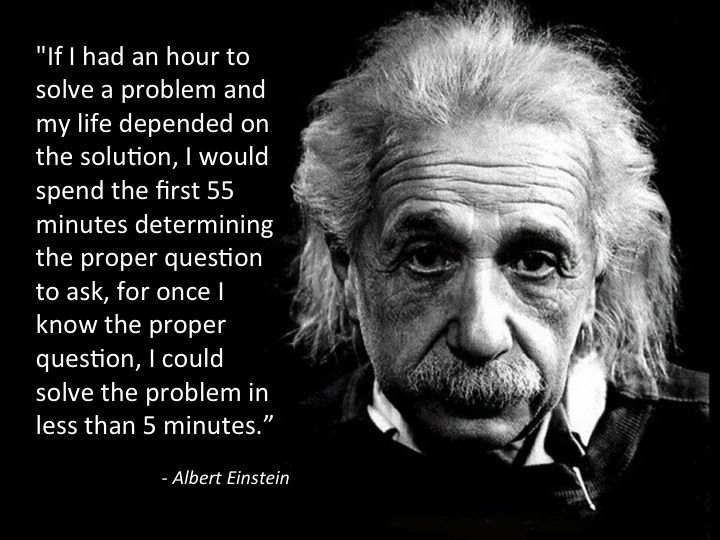
In 1905, an unknown patent clerk in Switzerland posed an odd, whimsical but profound question about physics:
“What would happen if I rode alongside a beam of light?”
This simple and counterintuitive question challenged the fundamental assumptions of the scientific world.
At that time, Newtonian physics was the foundation of scientific thought, comprising core concepts of: the mechanical universe of predictability, reductionism, determinism, cause and effect and equilibrium.
Focusing on his question led Albert Einstein to develop his special theory of relativity, which fundamentally altered our understanding of time, space, and energy.
The Power Of Asking The Right Question Is That It Unlocks Everything
Asking the right questions helps you uncover what’s beneath the surface, and that’s where the long-term big break-throughs and opportunities lie.
In the world of business, in the early days of Amazon, Jeff Bezos was asking a different set of questions to everyone else who were asking: “How do I build the next big tech startup?”
Bezos asked: “How can I use the internet to sell things people already want in a more efficient way?”
Before Tesla became a household name, most car companies asked: “How can we make electric cars affordable?”
Musk asked a different question: “Why aren’t electric cars already better than traditional cars?”
Finding The Right Question
Einstein’s quote suggests that the quality of your solution depends on the quality of the question guiding it.
Finding the right question is itself a process of clarification and reframing.
Here’s a practical framework for identifying the right question to ask. I have created a step-by-step mental checklist inspired by how Einstein might approach uncovering the right question before jumping into solutions.
Einstein’s Mental Checklist For Finding The Right Question:
Step 1: Name the Problem as You See It
- Write down the problem in one sentence.
- Avoid assumptions or solutions in the problem statement itself.
Example:
“Traffic congestion is bad” → too vague.
Better: “Commuters spend 2 extra hours daily stuck in traffic.”
Step 2: Ask the Context Questions
- What is known?
- What is unknown?
- What assumptions am I making?
- Who or what is affected?
Meta-question:
"What would someone outside this situation notice that I’m missing?"
Step 3: Zoom Out to the Bigger Picture
- Is this the root problem or a symptom of something deeper?
- If I solved this, what larger problem would it impact?
Meta-question:
"What’s the real “why” behind this problem?"
Step 4: Reframe the Problem in Many Ways
Take the original problem and restate it at least 5 different ways:
- Change the subject [people vs. technology].
- Change the time frame [now vs. long-term].
- Change the perspective [commuter vs. city planner vs. environment].
This generates unexpected angles.
Step 5: Test for Leverage
- If I solved this question, would other problems disappear automatically?
- Would this question lead to insight, not just data?
- Does it focus on causes, not just symptoms?
Meta-question:
"If I had only one answer, what question would make it count the most?"
Step 6: Check for Clarity
The best questions are:
- Simple (easy to explain to a child
- Actionable (can lead to real answers)
- Open-ended (invites discovery, not yes/no)
Step 7: Iterate Until It Feels Right
Refine the wording until you have a question that gives you an “aha” moment — it should make the problem feel more solvable rather than more complicated.
Einstein’s Guiding Meta-Question
“What question, if I had the answer, would make the problem vanish or become trivial?”
The Question And The Quest
The Power Of Asking The Right Question Lies In The Quest For Insight
The Question vs The Quest
The root of the words "question" and "quest" is the Latin verb "quaerere" meaning "to ask" or "to seek".
# A question is usually a request for information.
It usually asks: "what, when, where, who, or how?".
It can be factual and pragmatic: "What time does the train leave? What is 2 + 2?"
# A quest is not just about asking - it’s about seeking.
A quest implies movement, persistence, transformation.
It tends to be concerned with "why?" and "to what end?" - with meaning, purpose, and root causes.
So we can summarise this:
- Question = “What?” → data, facts, knowledge
- Quest = “Why?” → meaning, essence, wisdom
However, it has be noted that not all questions are fact oriented, and not all quests are about meaning.
Some questions themselves are quests, for example: "What is justice?
And some quests can be “how”- driven, for example: "How do I live well?"
A Guiding Principle
So we can pull this together as a guiding principle and say that:
- A question seeks an answer.
- A quest seeks understanding.
This is illustrated in the following two-column contrast between question and quest.
Question - Seeks an answer - About facts, data, information - Often framed as What? Who? When? Where? How? - Produces knowledge - Can be resolved quickly (once answered) - A point of inquiry
Quest - Seeks understanding - About meaning, purpose, authenticity - Often framed as Why? (but can also include How to live?) - Produces wisdom - Unfolds over time, may never be fully “answered” A path of transformation
The Right Question

The Right Question
- Most people chase answers as if truth were a prize buried somewhere outside themselves.
- When we ask from impatience, the mind hunts for conclusions and finds only words.
- But insight is not found through effort; it appears when the ground of the mind is quiet enough to reflect it.
- The right question is not asked with the tongue, but with the stillness that waits to see.
- When we ask from stillness, the question itself becomes a window, and what was hidden reveals itself.
Suggested Reading:
The Wise Advocate - Helping You Achieve The Very Best Outcome
Let Stillness Speak - Living Within A Complex System
Return from: "The Power Of Asking The Right Question" to Inner Mastery For Outer Impact or Walking The Talk
LATEST ARTICLES
Does Prayer Work? The Psychology of Prayer, Meditation and Outcomes
 Reality Is A Complex System Of Countless Interactions - Including Yours. So does prayer work? The problem is that the question itself is usually framed in a way that guarantees confusion. We tend to a…
Reality Is A Complex System Of Countless Interactions - Including Yours. So does prayer work? The problem is that the question itself is usually framed in a way that guarantees confusion. We tend to a…Living in Survival Mode Without Surrendering Mental Authority
Living in Survival Mode Without Surrendering Mental Authority
 Clear Thinking When You’re Just Trying to Stay Afloat. Many people today are overwhelmed because they are living in survival mode - not temporarily, but as a persistent condition of life. For many, th…
Clear Thinking When You’re Just Trying to Stay Afloat. Many people today are overwhelmed because they are living in survival mode - not temporarily, but as a persistent condition of life. For many, th…Manifestation Without Magic: A Practical Model
 Manifestation without magic is not a softer or more intellectual version of popular manifestation culture. It is a different model altogether. Popular manifestation teachings tend to frame reality as…
Manifestation without magic is not a softer or more intellectual version of popular manifestation culture. It is a different model altogether. Popular manifestation teachings tend to frame reality as…Staying Committed When You Can't See Progress - The Psychology of Grit
 Uncertainty Is Not The Absence Of Progress, Only The Absence Of Reassurance. One of the most destabilising experiences in modern life is not failure, but uncertainty and staying committed when you can…
Uncertainty Is Not The Absence Of Progress, Only The Absence Of Reassurance. One of the most destabilising experiences in modern life is not failure, but uncertainty and staying committed when you can…The Battle For Your Mind - How To Win Inner Freedom In A Digital Age Of Distraction
 From External Events to Inner Events. We often think of “events” as things that happen out there: the traffic jam, the rude comment, the delayed email reply. But what truly shapes our experience is wh…
From External Events to Inner Events. We often think of “events” as things that happen out there: the traffic jam, the rude comment, the delayed email reply. But what truly shapes our experience is wh…How to See Your Thoughts Without Becoming the Story
 A Practical Guide to Thought-Awareness. You can spend your life inside the stories of your mind without ever learning how to see your thoughts clearly and objectively. Most of the stuff we tell oursel…
A Practical Guide to Thought-Awareness. You can spend your life inside the stories of your mind without ever learning how to see your thoughts clearly and objectively. Most of the stuff we tell oursel…The Collison Decision Matrix - A Simple Framework for Better Choices
 The Collison Decision Matrix Is A Practical Everyday Thinking Tool. Most of us spend a surprising amount of time worrying about decisions. From small ones such as what to wear, what to eat, what to te…
The Collison Decision Matrix Is A Practical Everyday Thinking Tool. Most of us spend a surprising amount of time worrying about decisions. From small ones such as what to wear, what to eat, what to te…The Power Of Asking The Right Question
 The Power Of Asking The Right Question Lies In The Quest For Insight. To experience the power of asking the right question you must develop the practice of asking questions. The best way to improve th…
The Power Of Asking The Right Question Lies In The Quest For Insight. To experience the power of asking the right question you must develop the practice of asking questions. The best way to improve th…Site Pathways
 Here is a site pathway to help new readers of Zen-Tools navigate the material on this site. Each pathway is based around one of the many key themes covered on this site and contain a 150 word introduc…
Here is a site pathway to help new readers of Zen-Tools navigate the material on this site. Each pathway is based around one of the many key themes covered on this site and contain a 150 word introduc…How To Live With Contradiction - Beyond Thought Let Stillness Speak
 A major impact on so many peoples' lives is the situational contradiction of unfilled realistic expectations. So where does all this leave us? Well here we are, with mental equipment that is more lim…
A major impact on so many peoples' lives is the situational contradiction of unfilled realistic expectations. So where does all this leave us? Well here we are, with mental equipment that is more lim…How To Trust The Process Of Mindfulness - Right Now
 In mindfulness, the process isn’t some distant goal — it's what is happening right now. When we talk about how to trust the process of mindfulness the credibility of the process is heavily dependent…
In mindfulness, the process isn’t some distant goal — it's what is happening right now. When we talk about how to trust the process of mindfulness the credibility of the process is heavily dependent…
